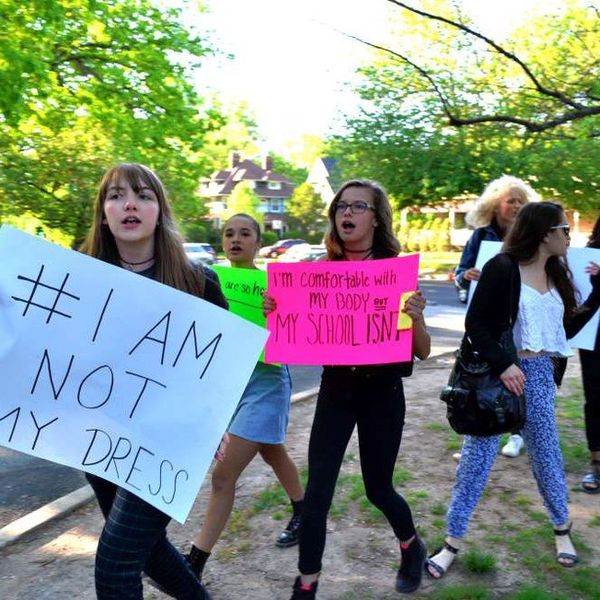Since any discussion about this kind of topic eventually turns into one about race, I'm going to go ahead and give you readers all of the ammunition you need to call out my point of view. I am a white, male, cisgender 20-year-old student who lived in suburban New Jersey for my entire life. My friend group at home is relatively homogeneous, and my only cultural immersion I've had is vacationing to various places for a week at most. With that out of the way, let's get to the real topic.
As many are aware, conflict grew to a boil last week at Yale University over an email sent out by Erika Christakis about Halloween dress. I don't want to mince her words, because her email was well-written, so here's the email attached for you to read and interpret yourself:
Dear Sillimanders:
Nicholas and I have heard from a number of students who were frustrated by the mass email sent to the student body about appropriate Halloweenwear. I’ve always found Halloween an interesting embodiment of more general adult worries about young people. As some of you may be aware, I teach a class on “The Concept of the Problem Child,” and I was speaking with some of my students yesterday about the ways in which Halloween – traditionally a day of subversion for children and young people – is also an occasion for adults to exert their control.
When I was young, adults were freaked out by the specter of Halloween candy poisoned by lunatics, or spiked with razor blades (despite the absence of a single recorded case of such an event). Now, we’ve grown to fear the sugary candy itself. And this year, we seem afraid that college students are unable to decide how to dress themselves on Halloween. I don’t wish to trivialize genuine concerns about cultural and personal representation, and other challenges to our lived experience in a plural community. I know that many decent people have proposed guidelines on Halloween costumes from a spirit of avoiding hurt and offense. I laud those goals, in theory, as most of us do. But in practice, I wonder if we should reflect more transparently, as a community, on the consequences of an institutional (which is to say: bureaucratic and administrative) exercise of implied control over college students.
It seems to me that we can have this discussion of costumes on many levels: we can talk about complex issues of identify, free speech, cultural appropriation, and virtue “signalling.” But I wanted to share my thoughts with you from a totally different angle, as an educator concerned with the developmental stages of childhood and young adulthood.
As a former preschool teacher, for example, it is hard for me to give credence to a claim that there is something objectionably “appropriative” about a blonde-haired child’s wanting to be Mulan for a day. Pretend play is the foundation of most cognitive tasks, and it seems to me that we want to be in the business of encouraging the exercise of imagination, not constraining it. I suppose we could agree that there is a difference between fantasizing about an individual character vs. appropriating a culture, wholesale, the latter of which could be seen as (tacky)(offensive)(jejeune)(hurtful), take your pick. But, then, I wonder what is the statute of limitations on dreaming of dressing as Tiana the Frog Princess if you aren’t a black girl from New Orleans? Is it okay if you are eight, but not 18? I don’t know the answer to these questions; they seem unanswerable. Or at the least, they put us on slippery terrain that I, for one, prefer not to cross.
Which is my point. I don’t, actually, trust myself to foist my Halloweenish standards and motives on others. I can’t defend them anymore than you could defend yours. Why do we dress up on Halloween, anyway? Should we start explaining that too? I’ve always been a good mimic and I enjoy accents. I love to travel, too, and have been to every continent but Antarctica. When I lived in Bangladesh, I bought a sari because it was beautiful, even though I looked stupid in it and never wore it once. Am I fetishizing and appropriating others’ cultural experiences? Probably. But I really, really like them too. Even if we could agree on how to avoid offense – and I’ll note that no one around campus seems overly concerned about the offense taken by religiously conservative folks to skin-revealing costumes – I wonder, and I am not trying to be provocative: Is there no room anymore for a child or young person to be a little bit obnoxious… a little bit inappropriate or provocative or, yes, offensive? American universities were once a safe space not only for maturation but also for a certain regressive, or even transgressive, experience; increasingly, it seems, they have become places of censure and prohibition. And the censure and prohibition come from above, not from yourselves! Are we all okay with this transfer of power? Have we lost faith in young people's capacity – in your capacity to exercise self-censure, through social norming, and also in your capacity to ignore or reject things that trouble you? We tend to view this shift from individual to institutional agency as a trade off between libertarian vs. liberal values (“liberal” in the American, not European sense of the word).
Nicholas says, if you don’t like a costume someone is wearing, look away, or tell them you are offended. Talk to each other. Free speech and the ability to tolerate offense are the hallmarks of a free and open society.
But – again, speaking as a child development specialist – I think there might be something missing in our discourse about the exercise of free speech (including how we dress ourselves) on campus, and it is this: What does this debate about Halloween costumes say about our view of young adults, of their strength and judgment?
In other words: Whose business is it to control the forms of costumes of young people? It's not mine, I know that.
Happy Halloween.
Christakis faced backlash over the email, and her husband and Master of Silliman College at Yale, Nicholas, sided with her, setting up time to have a public forum to discuss opinions on the matter. At one of these forums, the following video was recorded:
This is a terrible response. The main student in the video that was yelling at Christakis does not understand or respect what college should be about. Ideally, college is about continuing education beyond high school and learning how to find yourself in the world. It's about meeting people from all walks of life and being able to communicate with, and learn from, those people. In the video, this student shouts, "It is not about creating an intellectual space! It is not! Do you understand that? It’s about creating a home here!" That statement speaks volumes about how distorted this student's views on college are. Have colleges become a place where comfort is valued over intellectual pursuit, and if not, should they? This student has said they think the head of a college should focus on coddling their students more than giving them intellectual stimulation, and that is fucked up. To call this protester a student is insulting to students everywhere.
Even more ridiculous is the fact that a petition has been created to force both Erika and Nicholas Christakis to resign from their positions at Yale. When students hold such little respect for their professors that they interrupt them mid-sentence to yell and curse at them, there is a serious problem. When individuals are verbally attacked for trying to have a discussion with differing opinions, the future of free speech and thought must be seriously considered. If universities are going to continue to admit students who want to squelch discussion, thought, and learning and allow them to remain students, these universities will be going directly against what they were originally built to foster.
As students, we need to side with people who are being bullied out of sharing their opinions, be it professor, student, or otherwise. We need to continue pursuing higher knowledge and encouraging open discussion. If we don't, when our children reach college age, universities will be a shallow husk of what they once were, devoid of intellectual discussion and only meant to continue hand-holding the new members of society.





















